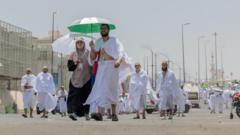In an effort to ensure the safety of over 1.4 million pilgrims joining this year's Hajj pilgrimage in Mecca, Saudi authorities are enforcing strict guidelines to combat extreme heat conditions. After last year's tragedy, which saw 1,300 pilgrims perish, mostly from heat exposure, the government has ramped up its safety measures.
This includes planting thousands of trees and installing around 400 cooling units, aiming to alleviate predicted temperatures of 44°C (111°F). Notably, children under 12 have been banned from the pilgrimage, and those attempting to enter Mecca without an official permit could face hefty fines and long-term bans.
Authorities reported that over 269,000 people have already been prevented from entering Mecca. Many deaths last year occurred among unregistered pilgrims who did not have access to air-conditioned accommodations or proper transport at peak heat levels of 51°C.
The Hajj is a central religious duty for Muslims, traditionally undertaken at least once in a lifetime by those who are able. Pilgrims begin the event in simple white clothing for men and modest attire for women, congregating at the Grand Mosque to perform sacred rituals.
In response to health concerns this year, the Saudi Health Ministry has issued warnings for pilgrims to avoid direct sun exposure during peak hours, use umbrellas, and stay hydrated. Enhanced shaded areas and cooling roads are also part of the new measures. Additionally, drones monitored by AI will help manage crowd safety throughout the event, showcasing the kingdom's commitment to ensuring a safe pilgrimage experience.
This includes planting thousands of trees and installing around 400 cooling units, aiming to alleviate predicted temperatures of 44°C (111°F). Notably, children under 12 have been banned from the pilgrimage, and those attempting to enter Mecca without an official permit could face hefty fines and long-term bans.
Authorities reported that over 269,000 people have already been prevented from entering Mecca. Many deaths last year occurred among unregistered pilgrims who did not have access to air-conditioned accommodations or proper transport at peak heat levels of 51°C.
The Hajj is a central religious duty for Muslims, traditionally undertaken at least once in a lifetime by those who are able. Pilgrims begin the event in simple white clothing for men and modest attire for women, congregating at the Grand Mosque to perform sacred rituals.
In response to health concerns this year, the Saudi Health Ministry has issued warnings for pilgrims to avoid direct sun exposure during peak hours, use umbrellas, and stay hydrated. Enhanced shaded areas and cooling roads are also part of the new measures. Additionally, drones monitored by AI will help manage crowd safety throughout the event, showcasing the kingdom's commitment to ensuring a safe pilgrimage experience.





















